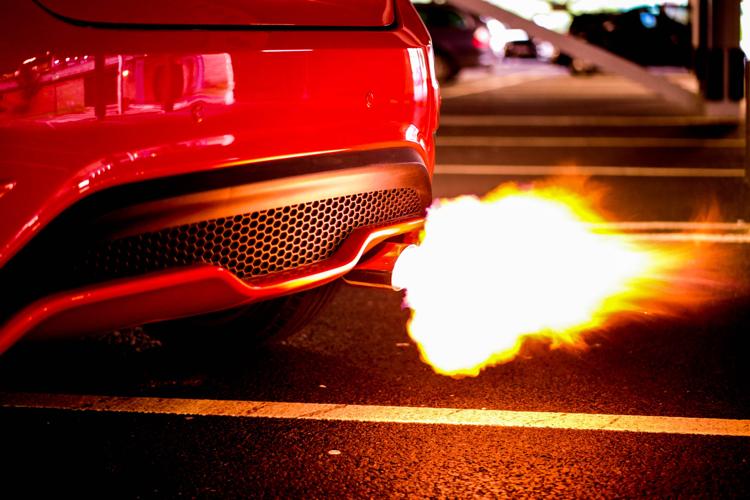- +254 757 360 543
- info@msacarmarket.com
- Ganjoni, Mombasa Kenya

Exhaust Fumes, Smoke and their Meaning.
Is there a difference between fumes and smoke? Yes there is; smoke is a mix of fine solid (dust) and liquid particles in a gaseous medium, formed by burning, while fumes are fine airborne particles (vapor or gas) produced when a solid vapourises and condenses. Both fumes and smoke are given off by a substance as a result of a chemical reaction like; heating, explosion or detonation.
The exhaust smoke from a healthy car should always be colourless / translucent. If there's a problem in the exhaust system, the exhaust pipe starts producing coloured smoke that could be white, black or blue/ grey, depending on the nature of the problem. During your vehicle test drive be sure to pay attention to the exhaust system as it tells a lot about the health of the vehicle you're planning on buying.
Blue smoke means the wear of an engine that consumes too much oil, usually occurs when some engine oil is getting burned off. Worn or damaged piston rings allow oil to enter the combustion chamber, creating smoke with a bluish tinge. This problem may be visible at startup but could disappear as your engine warms up.
Black smoke is probably less of a concern as the engine may simply be out of order or dirty, usually causing incomplete combustion of your fuel/air mixture. This could also be related to problems with the quality of your gas, engine airflow problems or issues with your spark plugs and/or ignition coils.
White smoke indicates the presence of water vapor, which may reveal a worn cylinder head gasket. The presence of water in the combustion chamber will create a whitish exhaust caused by a broken or blown head gasket, which allows engine coolant/water to seep into your pistons, creating a white smoke with a noticeable odor.
If your drive is being disturbed by unusual smells of exhaust fumes reaching the car interior, you’ll need to get that fixed quickly as not only does it signal a serious problem with the car, it’s also very unpleasant and may even affect your health and that of your passengers including children.
Some common yet unusual car smells include the smokey Smell, petrol smell when driving or idling, sweet smelling smoke, or the absolutely horrible smell of sulphur / rotten eggs.
Petrol Smell – Rich air / fuel ratio, too much fuel, or not enough air, being added to the engine, this could be accompanied by black smoke plumes exiting your exhaust. In severe cases it could lead to a damaged catalytic converter.
Sulphur Smell – Broken or damaged catalytic converter which is used to filter the polluting hydrocarbons, carbon monoxide and nitrogen oxides and convert them into water vapour, leaving the remaining emissions less harmful to the environment. The smell of rotten eggs coming from your car indicates the catalytic converter has failed due to wear and tear or contamination from petrol.
Smokey Smell – Exhaust Leaks are quite common, usually caused by unavoidable wear and tear like debris on the road, rocks or stones that have been flicked off the road surface and cracked the pipe open. If the leak is behind the catalytic converter, you will notice a nasty smell coming from the car due to the emissions which have not yet been filtered. You might hear a difference if the crack is before a silencer that’s on your car’s exhaust system. If the smell doesn’t catch your attention, a loud rattle or rumble will.
The timing of when you smell exhaust can sometimes help you figure out where the leak is coming from. If you smell exhaust all the time, it's likely coming from near the front of the system. This could be due to physical damage, or it could be related to the exhaust manifold gasket. If you only smell it when you're idling, chances are it's nearer to the back of the system.
The most common signs of exhaust system failure are; check engine light due to a failing exhaust system, loud acceleration, unusual smells, poor fuel efficiency, car losing power, vibrations and rattling Noises. A full service by a professional mechanic is recommended to sort the problems out. Otherwise you can choose a different vehicle in better shape.
An exhaust leak is dangerous. It might be tempting to drive your car to a service station when you smell exhaust, but it is better to call for a tow truck, instead. Breathing exhaust fumes can give you carbon monoxide poisoning. In addition to other unpleasant symptoms, this can cause dizziness, confusion, blurred vision, and even loss of consciousness. Having some of these symptoms while driving can be disastrous. Don't put your life and other lives in danger, have exhaust leaks checked out immediately.
There are also long-term health risks to some of the hydrocarbons that expel from your vehicle’s exhaust. One of the most common hydrocarbons in exhaust fumes is benzene, which is a liquid that vaporizes and becomes a gas at relatively low temperatures. Benzene can be extremely dangerous if inhaled at high concentrations over a long period. It reacts with your body’s cells and causes them to stop reproducing correctly by affecting the bone marrow. This will cause your body to stop producing red blood cells, which can wreak havoc on your immune system. There are also credible links to leukemia with long-term benzene exposure.
So be sure to be keen on exhaust system performance during your test drive, that way you will not incur extra cost caused by hidden issues later on after buying your car.


